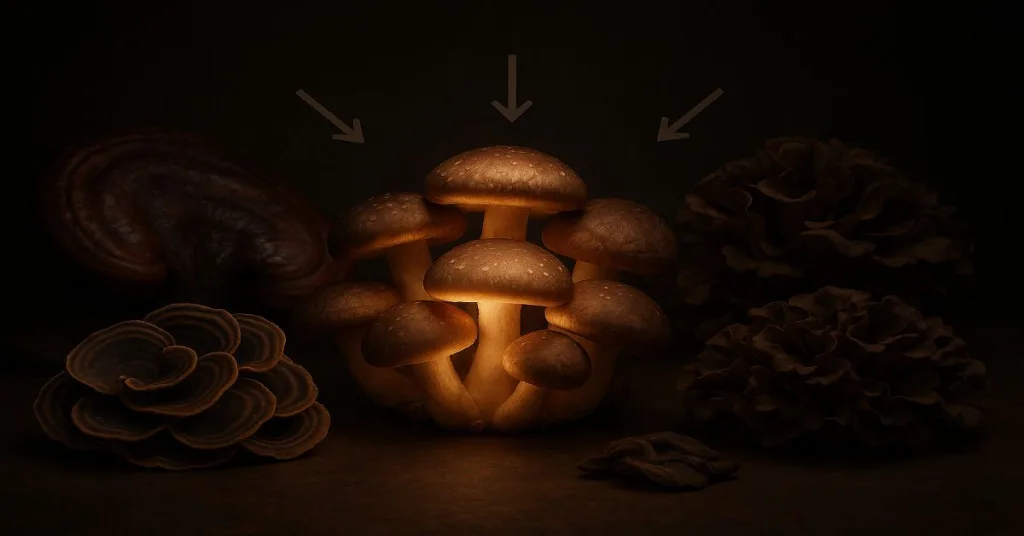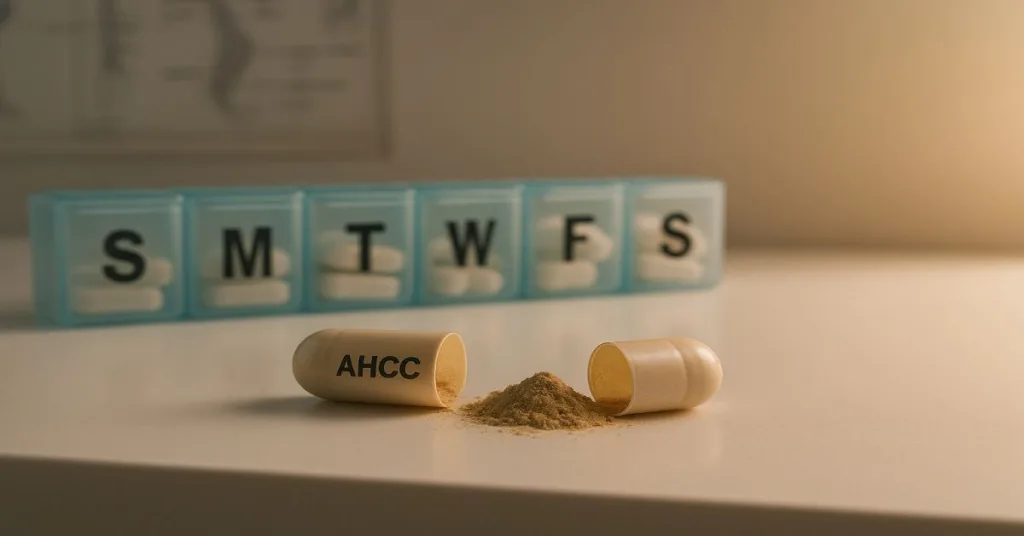When people talk about mushroom supplements, it usually means reishi, turkey tail, maitake, or a generic “immune blend” in a capsule. But if you’ve been digging into immune health or cancer-adjacent research, you’ve probably come across an AHCC supplement (Active Hexose Correlated Compound).
Unlike most mushroom powders on Amazon, AHCC is a patented extract of shiitake mycelia with real clinical trials behind it. Some of the research is modest, some is controversial, but it’s one of the few mushroom-derived supplements with actual human data on things like quality of life during chemotherapy, vaccine response, and immune recovery.
This guide breaks AHCC down fully: what it is, how it works, what the evidence says, how it compares to other mushrooms, and whether it’s worth the price.
This post may contain affiliate links. If you click and purchase, I may earn a small commission at no extra cost to you. I only recommend products I personally use or have thoroughly researched.
What AHCC Actually Is
- Origin: Extracted from the mycelia (root-like growths) of shiitake mushrooms, then cultured in a proprietary process developed in Japan.
- Key distinction: Unlike turkey tail or reishi, which are rich in β-glucans, AHCC is dominated by α-1,4-glucans — smaller, partially acetylated molecules that the body may absorb more efficiently.
- Trademarked: AHCC® is controlled by Amino Up in Japan. If the label doesn’t say AHCC, it’s not the same thing.
This is why you don’t see “generic AHCC” everywhere. It’s not just dried shiitake powder.
How AHCC Works in the Body
AHCC doesn’t simply “boost immunity.” That’s supplement-industry filler language. The real story:
- Immune modulation: In studies, AHCC activates natural killer (NK) cells, dendritic cells, and certain T-cell subsets.
- Cytokine balance: It nudges the immune system toward more effective surveillance, not chronic inflammation.
- Possible pathway: Toll-like receptors (TLR2/TLR4) are suspected to be part of the mechanism, but that’s still under investigation.
Bottom line: AHCC seems to train the immune system, not just crank it up.
Quality of Life Benefits (Where AHCC Stands Out)
This is where AHCC separates itself from the usual mushroom hype.
1. Chemotherapy-related taste disorders (dysgeusia)
- Randomized trial in pancreatic cancer (n=98): Patients on AHCC had fewer taste changes from chemo and better nutrition compared to placebo.
- Why it matters: Loss of taste wrecks appetite and daily life — AHCC helped keep food tolerable.
2. Vaccine response
- Healthy adults, n=30: Taking AHCC around flu vaccination led to higher protective antibody titers against influenza B and changes in immune cell populations.
- Translation: Better immune “memory” formation.
3. Fatigue & immune recovery
- Small studies suggest improvements in fatigue, especially in cancer patients, though data is early.
- Immune markers (NK cell activity) rebound faster after stressors like surgery or chemo when AHCC is in the mix.
These are tangible quality-of-life outcomes you won’t find with the average mushroom powder.

Other Claimed Benefits (Where the Evidence Is Weaker)
- HPV clearance: Some open-label studies suggest AHCC may help women clear persistent HPV infections. Promising, but still small and preliminary.
- Cancer outcomes: Lab and animal data suggest tumor-inhibiting effects. Human data is limited, mostly showing improved QOL, not survival.
- Liver support: Some trials in hepatitis patients showed improved liver enzymes. Not replicated widely.
Worth watching, but not “proven.”
How AHCC Compares to Other Mushroom Supplements
- Reishi: Great for stress, sleep, and potential blood pressure support. But reishi trials on cancer QOL are weaker than AHCC.
- Turkey Tail (PSK/PSP): In Japan, PSK (a turkey tail extract) is used alongside chemo — strong data. The catch? That’s prescription-grade PSK, not the $20 turkey tail powder online.
- Maitake (D-fraction): Some immune effects, but data is inconsistent.
Why AHCC stands out: It’s standardized, studied, and targeted at QOL in clinical settings. Most other mushroom supplements are either under-dosed or based on extracts not available in U.S. supplements.

Dosage & Forms
- Clinical range: Most human studies use 3–6 grams per day, usually split into 2–3 doses.
- Market products: Capsules are typically 500 mg each. That means:
- 3 g/day = 6 capsules
- 6 g/day = 12 capsules
👉 This is why many people run out fast — and why buying from brands with bulk bottles matters.
Safety & Side Effects
- Generally well tolerated.
- Mild GI symptoms (bloating, diarrhea) are the most common side effects.
- Not known to interact with most meds, but if you’re on immunosuppressants or chemotherapy, talk to your doctor first.
Who Might Consider AHCC
- People undergoing chemo or radiation who want better quality of life support (taste, fatigue, appetite).
- Anyone looking for immune resilience during vaccination or recovery.
- Health-conscious supplement users who want a mushroom product with actual trials behind it.
Who Probably Shouldn’t
- People who think AHCC is a cancer cure — it’s not.
- Those on tight budgets — AHCC is expensive, and benefits are mostly QOL, not life-saving.
- Anyone with immune-suppressing conditions (transplant patients, autoimmunity under drug therapy) without doctor oversight.
The Bottom Line
Most mushroom supplements on the market are under-researched, under-dosed, or just powdered hype. AHCC isn’t perfect, but it’s one of the rare mushroom extracts with real human trial data showing benefits you can feel in daily life.
For people chasing immune support, especially during stressful health events, AHCC has a stronger case than almost anything else in the mushroom aisle.
If you’re considering trying AHCC, you can find it here on Amazon.
see also: Mushrooms as Supplements: Do They Actually Work or Is It All Hype?